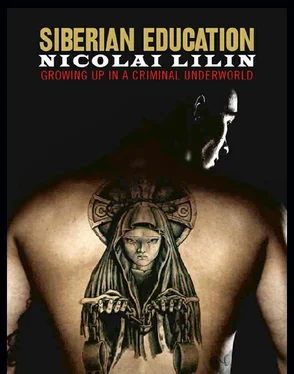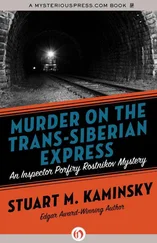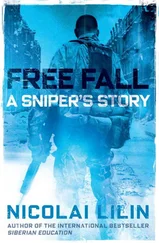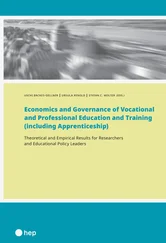‘Since when have little boys been allowed to argue with adult criminals?’
Then he kept repeating the same phrase over and over again:
‘Do you want to shoot an Authority? Well, shoot me, then!’
Gagarin stood motionless; I couldn’t tell what he was thinking.
I noticed that Pavel’s people were planning something; one had left the table and gone towards the kitchen. Meanwhile Pavel came over to us and went along the line, shouting in each of our faces, asking if we still wanted to kill him.
Mel and the others kept still and silent; it was very clear that they didn’t want to make a false move and were waiting for an order or a signal from Gagarin, who sat motionless at the table, with his back turned.
When Pavel came to me and I smelled his breath, reeking of wine and onions, coming out of his disgusting mouth together with the same words as before, I pulled Grandfather Kuzya’s Nagant out of my pocket. Putting it against the brute’s fat cheek and pressing so hard that the end of the barrel sunk into the skin of his face, which was distorted with surprise, I said:
‘Grandfather Kuzya loaded this for me, do you understand? He said I could kill anyone who stops me catching the person who raped our sister. Even an Authority, if necessary.’
He stood rooted to the spot and glared at me with eyes full of anger, but also of sadness. Gagarin got up from the table and announced to all present that we were going to leave the district and that we would take Pavel with us, to make sure no one took a shot at us as we left.
A man stood up. His face was disfigured by a long scar which started from his forehead, ran across his right eye and nose and ended on his neck. Very calmly he said to us:
‘No one will hurt you; we had already agreed on that before you came. We were intending to report Pavel to the Authorities.’
Little by little it emerged from his explanation that Pavel, with the help of some people who had already been locked up in a safe place, had planned a series of murders and other violent acts to provoke a war among the various communities. His aim was to gain control of the trafficking of alcohol, which was in the hands of a group of old criminals from various districts.
While the man with the scar was talking Pavel had turned pale, and with my pistol stuck into his cheek I could feel through the steel how much he was trembling. It was the end for him, and he knew it.
The man introduced himself as ‘Paunch’. I had never heard of him. From his way of talking and standing, with his back bent and his head leaning forward, I realized that he had recently come out of prison. He confirmed this shortly afterwards: he had been released less than a month earlier, he said; and he added that when he was inside many had complained about the way Pavel supported the prison. He only sent aid to people he had chosen himself, he had never visited anyone and he had actually encouraged some internal wars, which had proved devastating. So on instructions from some elderly criminals Paunch had infiltrated Pavel’s gang to check up on it and report back.
In other words we were talking to a voydot , a criminal executor and investigator who answered only to the old Authorities, and whose task it was to uncover injustices committed by the young Authorities and the Guardians.
It was the first time in my life I’d seen a person on such an assignment; usually they kept their identity secret, though of course Paunch might not have been his real name.
Paunch went on with his story: he said Pavel had hired a group of young Ukrainians to stir up trouble. During the past month they had killed two people, and no one had been able to trace them because everything had been organized to make it seem like an attack carried out by another district – a declaration of war. These were the same methods the police had used years before.
I couldn’t believe my ears; the situation seemed surreal.
‘What about Ksyusha? Why did they rape her?’ I asked.
‘Just for fun. Because they were out of their minds. There was no other reason,’ replied Paunch. ‘But it roused your community, so Pavel tried to keep them hidden, but they went on causing trouble all over the place.’
Everyone had seen them; they’d left traces everywhere. Gagarin and the others had clashed with them, and after the shoot-out they had tried to get out of town, taking the road through Balka. Stepan too had reported their presence in that district; they had taken cigarettes and beers from his kiosk without paying and beaten up Nixon, but he had managed to hurt one of them with his iron bar – which was quite a surprise for a disabled man. But a group of Armenians had been waiting for them at the entrance into Caucasus. They had tried to drive their four-by-four through an orchard, and had knocked down one Armenian, but then they had crashed into a little river that ran between Caucasus and Balka.
All this had happened in the space of two hours, and now these thugs were in the hands of the Armenians, who Paunch said were waiting for us.
Paunch said we would have to go there together, because he needed them to confirm in the presence of three witnesses that they had been paid by Pavel: only then could he take him before the old Authorities for judgement.
‘You keep Pavel until you’re sure what he’s told you is true,’ he concluded.
One of us, therefore, would have to give up his place to Pavel and go in another car with Paunch. Without giving the others time to make up their minds, I volunteered.
We went in a car driven by a boy from Centre.
‘Are you really so keen to kill those people?’ Paunch asked me when we had set off.
I thought this over for a moment before replying:
‘I’m not a murderer; I get no pleasure out of killing. I just want justice to be done.’
Paunch didn’t reply; he just nodded and turned towards the window. He remained like that, still and silent, until we reached Caucasus. He seemed struck by what I had said, but I wasn’t sure whether he agreed or not.
When we arrived in Caucasus we drove to the house of an old Armenian called Frunzich. I knew him; he was a good friend of my grandfather’s; he had been one of the organizers of the armed revolt of the prisoners in the Siberian gulags in 1953. He’d had a very sad life, but had never lost his cheerful disposition: even a short conversation with him left you feeling full of energy.
Frunzich was waiting for us in a car outside the front door of his house, with three other Armenians – young guys; one was only a teenager. When he saw us coming he switched on the ignition and drove off in front of us, to lead the way.
He took us to an old military warehouse on the outskirts of the district, where fields and patches of woodland began. It had been built by the Germans in the Second World War and had a number of basements which were often used by various criminals for dirty business, when it was necessary to shed a bit of blood.
In the yard there were about twenty Armenians, men and boys, all armed with rifles or Kalashnikovs. They were standing around a very battered four-by-four; its windscreen was smashed and a door on the right-hand side was missing. Inside the four-by-four sat five men. They looked terrified, and for some reason were stark naked.
Their clothes were piled up in front of the car near two bodies. One had a still bleeding wound in its neck, the other a hole in its head, from which the blood had stopped flowing.
I got out of the car after Paunch and went over to stand beside my friends, who were looking with interest at the faces of those five still alive animals.
‘They’re all ours. But first it’s Paunch’s turn,’ said Gagarin.
Before I had time to wonder how Paunch was going to make them talk I saw Pavel collapse on the ground, felled by a very hard kick.
Читать дальше










